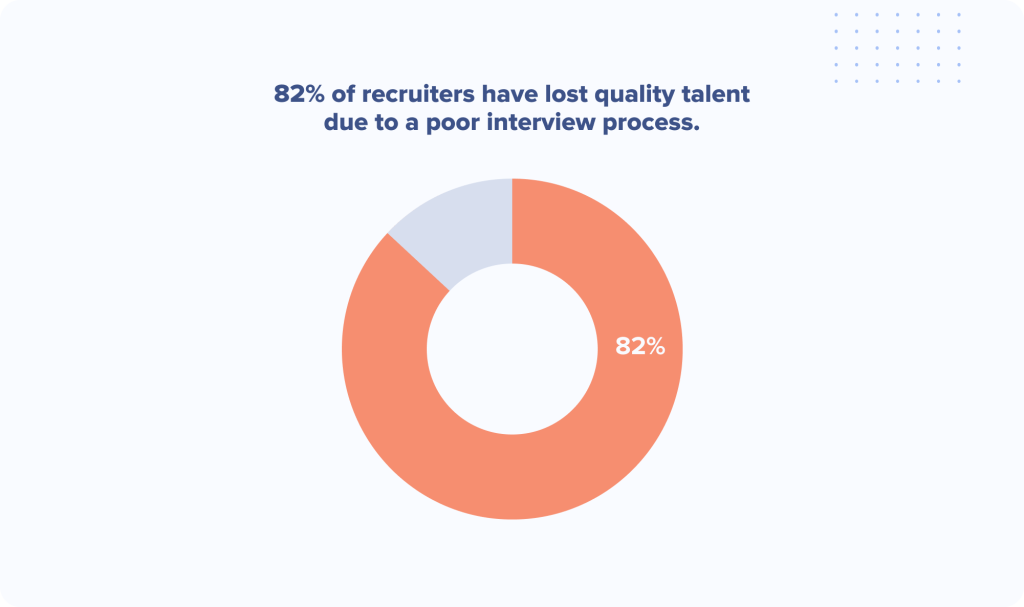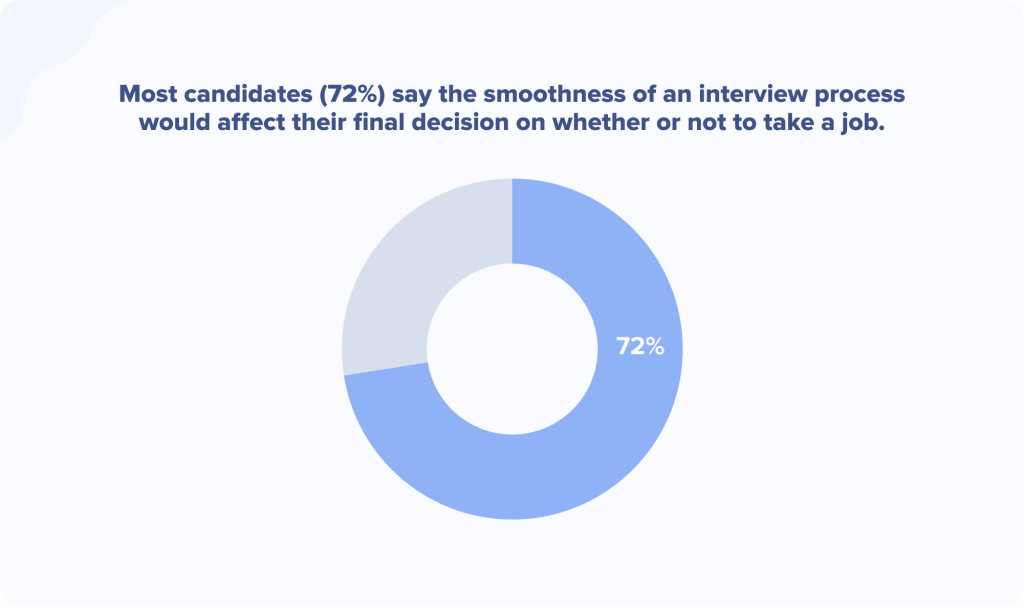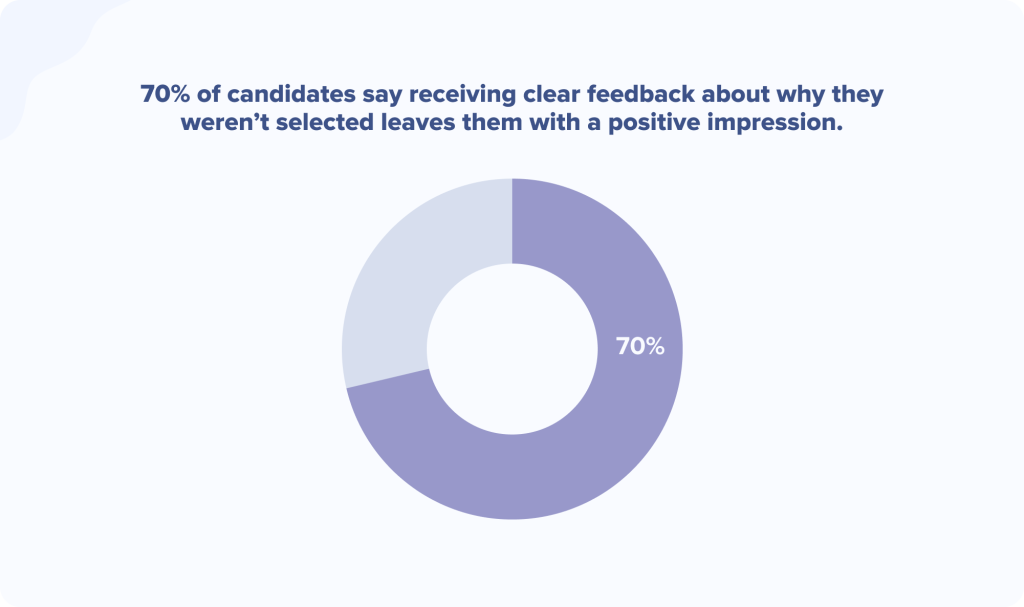
Subscribe for updates
Get talent acquisition best practices, trends, and news delivered directly to your inbox.
By entering your email, you agree to receive marketing emails from JobScore
Finding and hiring great talent is crucial for growing your business, but the interview process can be challenging to get right. Many companies struggle with lengthy hiring cycles, inconsistent evaluation methods, and poor candidate experiences that drive away qualified applicants. In fact, 82% of recruiters have lost quality talent due to a poor interview process.

The good news is that small changes to your interview process can yield significantly better hiring outcomes. Let’s explore how to conduct effective interviews that help you identify qualified candidates while creating an engaging experience that makes top talent want to join your team. You’ll learn practical techniques for streamlining your hiring process, evaluating candidates consistently, and making better hiring decisions in 2025.
Why a well-executed interview process matters
A third of candidates said a slow or disorganized interview process leads them to believe the employer doesn’t care about their time (34%) — or simply doesn’t care about candidates (33%). This can lead to dissatisfaction and candidate churn, especially for your most in-demand job seekers.
An effective interview process does more than help you evaluate candidates — it also keeps candidates engaged and influences their decision to join your team.
Make more informed hiring decisions
Systematically evaluating candidates using defined criteria makes you more likely to select people who’ll succeed in the role. This approach leads to more reliable predictions of job performance and better hiring outcomes.
Improve candidate experience and acceptance rates
Most candidates (72%) say the smoothness of an interview process would affect their final decision on whether or not to take a job. This makes sense when you consider that the interview is often a candidate’s first real interaction with your company.
The best candidates often have other opportunities available to them and won’t stick around if they’re treated poorly or feel that their time is being wasted.

Decrease employee turnover
Companies with positive candidate experiences are 3x more likely to improve employee retention. Treating people well from the beginning of your relationship with them is a great way to build early engagement and retention.
Plus, better hiring decisions often lead to improved job satisfaction and longer employee tenure. People more likely to succeed in their roles and stay with your team long-term when they’re properly evaluated for both skills and cultural alignment.
Save time and money
Streamlining your interview process can help you identify qualified candidates more efficiently and a positive candidate experience can help you engage them. These benefits can result in a lower cost per hire, while helping you move faster than competitors who are pursuing the same talent.
Boost your employer brand
A well-structured interview process creates a positive impression on candidates, making them more likely to recommend your company to others and leave positive employer reviews. This enhanced reputation can help you build a strong talent pipeline and reduce the time needed to fill future positions.
Setting yourself up for an effective interview process
Successful interviewing begins long before you meet your first candidate. Taking time to prepare helps you evaluate applicants consistently and make better hiring decisions.
Here’s how to lay the groundwork for effective interviews.
1
Define the job requirements and create an ideal candidate profile
Start by clearly defining what you’re looking for in your ideal candidate. Work with the hiring manager and other stakeholders to identify must-have skills, qualifications, and traits. Document these requirements and create an evaluation rubric that your interviewers can use to assess candidates consistently.
2
Define your interview process
Design your interview process to properly evaluate your previously defined criteria efficiently.
Half of companies report interview processes that take over four weeks, and 42% have candidates undergo five or more interviews before a decision is made. This extended timeline can result in candidate churn.
Carefully consider how many interviews — and what types — you really need to assess your candidates’ qualifications. For example, could you forgo a recruiter screening and go right to the hiring manager screening? Or could you replace three individual interviews with a panel interview or lunch meeting? It’s ok if you truly need five or more interviews, but make sure you’re not just doing it out of habit.
The goal is to thoroughly evaluate candidates without creating unnecessary steps.
3
Create an interview plan
Create an interview plan that clearly defines who will interview candidates, what qualifications they’ll evaluate, and specific questions they should ask. This structure helps you gather consistent information while ensuring you assess all critical requirements. Include rating criteria for each competency to help interviewers evaluate responses consistently.
4
Train interviewers
Interviewing isn’t your team members’ day job, and they may need guidance to conduct an effective interview.
Train your interviewers on topics like interview etiquette, how to sell your opportunity, illegal interview questions to avoid, and how to mitigate unconscious biases. Also provide remote interview training, if applicable, as meeting candidates in a virtual environment can differ from an in-person interview.
Making sure everyone involved understands how to create a welcoming environment while effectively evaluating candidates is crucial for favorable hiring outcomes.
5
Prepare your candidates
More than a quarter of candidates (28%) want to know your interview process ahead of time. Consider sharing a preview of what to expect in your job description or, at the very least, in your interview confirmation email.
Your interview confirmation email should also include key details like the date, time, and duration of the interview, the location, who the candidate will be meeting, and the office dress code. Some companies are even beginning to share interview questions ahead of time.
Preparing your candidates for their interviews can help put them at ease so they can focus on showcasing their expertise.
Conducting an effective interview
The way you conduct interviews significantly impacts both the quality of information you gather and the candidate’s experience. Focus on creating an environment where candidates can showcase their capabilities while maintaining a professional, structured evaluation process.
Start by thoroughly preparing for each interview. Review the candidate’s resume and application in advance. Prepare your questions and evaluation materials. Test any technology you’ll be using, especially for virtual interviews. Being organized shows respect for the candidate’s time and helps the conversation flow smoothly.
Respect your candidates’ time
A candidate is 28% more likely to withdraw following their first interview if one of their interviewers shows up late. Start interviews promptly and stick to scheduled durations. If you’re running behind, proactively communicate with candidates and ask if they have some flexibility in their schedule. This demonstrates that you value their time and maintains a professional atmosphere.
Set a positive tone
Greet the candidate warmly, introduce yourself and your role, and briefly explain how the interview will proceed. Over half of candidates (51%) said an interviewer’s attitude or behavior would cause them to voluntarily pull out of the recruitment process. Making candidates feel welcome helps them perform their best.
Follow your interview plan
Use your interview plan and to purposefully guide the conversation, asking follow up questions to dig deeper into your candidate’s responses. Rate candidates on each of the competencies you’ve been assigned to evaluate, taking notes to document specific examples and observations that’ll help your team make a hiring decision later.
Watch for red flags
Stay alert for potential red flags that might indicate the candidate doesn’t meet your qualifications.
For example, watch for inconsistencies in how candidates describe their experience or accomplishments. Pay attention if they consistently speak in generalities rather than providing specific examples, or if they seem to dodge direct questions about their capabilities or past roles.
Document these concerns objectively and discuss them during your interview debrief to gain additional perspectives before making final decisions.
Sell the candidate on your opportunity
Remember that candidates are evaluating you too. Learn about their motivations for finding a new job and share what your company can offer.
For example, discuss flexible work policies if your candidate is struggling with return-to-office mandates. Or pair them with a recently promoted interviewer if you know that career growth is important to them.
Share what’s in it for the candidate each step of the way so they understand what they’ll receive in exchange for their contributions. This includes sharing candidate motivations with interviewers so they can share their unique perspectives, and reiterating the benefits of joining your team when you make an offer.
Leave time for candidate questions
Always reserve adequate time for candidates to ask their own questions. This part of the interview serves multiple purposes: It helps candidates gather information they need to evaluate your opportunity, reveals what they value in a workplace, and demonstrates their level of interest and preparation.
Answer honestly, even if that means acknowledging challenges or admitting you don’t know something. If you need to follow up with information later, make note of it and follow through.
Provide next steps
End each interview by clearly explaining next steps in your hiring process. Let candidates know when they can expect to hear from you, who will contact them, and what subsequent stages might involve.
If you anticipate any delays or have a particularly lengthy evaluation process, be upfront about this. Providing this information helps manage expectations and reduces anxiety for candidates waiting to hear back. It also demonstrates that your company is organized and respectful of candidates’ time.
Following through after the interview
What you do after interviews is just as important as the conversations themselves. Having a clear follow-up process helps you make good hiring decisions while maintaining candidate engagement.
Complete your interviewer scorecard
Complete your evaluation immediately after each interview while your observations are fresh.
Use your scoring rubric to rate candidates objectively on each requirement and document specific examples that support your ratings. This detailed record helps you compare candidates fairly and defend your decisions if needed.
Debrief with team members
If multiple people interviewed the candidate, hold a debrief session to share observations and align on evaluations. Different perspectives can reveal important insights about a candidate’s potential fit. These discussions help ensure hiring decisions reflect input from all stakeholders.
Follow up with candidates quickly
Communicate promptly with candidates after each interview; they’re eager to know if they’ll be moving on to the next stage or receiving a job offer.
When you’ve identified your preferred candidate, move quickly to make an offer. Top talent often has multiple opportunities, and delays can lead to losing strong candidates to competitors. Call to deliver the offer verbally, then follow up with written documentation of the details.
For candidates you’re not selecting, send a thoughtful rejection letter explaining your decision. While this can feel uncomfortable, 70% of candidates say receiving clear feedback about why they weren’t selected leaves them with a positive impression.

Run an interview retrospectives
Review your interview process regularly to identify improvement opportunities. Track metrics like time to hire, offer acceptance rates, and candidate feedback. Use these insights to refine your approach and create an even more effective hiring process.
How JobScore enables a better interview process
An applicant tracking system like JobScore can help you enable an interview process that yields high-quality hires and provides each candidate with a positive interview experience.
Seamless scheduling
Comprehensive interview templates
Actionable reports
Final thoughts on interviewing candidates in 2025
A well-executed interview process is essential for building skilled teams, but too many hiring teams treat it like an afterthought.
Planning, conducting, and following up after interviews takes time and effort to get it right — but it’s well worth the effort. The investment you make in improving your interview process will return dividends through stronger hires, reduced recruiting costs, and a reputation that makes top candidates want to join your team.
Want to see how JobScore can help your team build a more effective, efficient interview process?


![Interview Invitation Emails [Templates + Tips]](https://www.jobscore.com/wp-content/uploads/interview-invitation-emails-scaled.jpg)
